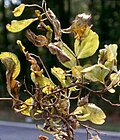Phytoplasma
Phytoplasma are a genus of bacteria that lack a cell wall and are characterized by their small size and pleomorphic shape. They belong to the class Mollicutes, which includes other wall-less bacteria. Phytoplasmas are obligate parasites of plant phloem tissue and are transmitted by insect vectors, primarily by species of leafhoppers, planthoppers, and psyllids. These organisms are responsible for causing a wide range of plant diseases, which are collectively referred to as "phytoplasma diseases" or "yellows diseases" due to the yellowing symptoms often observed in infected plants.
Characteristics[edit]
Phytoplasmas are unique among bacteria due to their lack of a cell wall, which contributes to their pleomorphic shape, meaning they can vary in form. This characteristic makes them difficult to study and classify using traditional bacterial taxonomy methods. They range in size from 0.2 to 0.8 µm in diameter and are thus among the smallest bacterial pathogens capable of causing disease in plants. Phytoplasmas contain DNA, RNA, ribosomes, and a plasma membrane but lack many cellular structures found in other bacteria, such as flagella.
Life Cycle and Transmission[edit]
The life cycle of phytoplasmas involves two hosts: a plant host and an insect vector. Phytoplasmas reside in the phloem tissue of infected plants, where they are ingested by leafhoppers or other sap-sucking insects during feeding. Once inside the insect, the phytoplasmas multiply and eventually move to the salivary glands, from where they can be transmitted to other plants when the insect feeds again. This complex life cycle makes the control and management of phytoplasma diseases challenging.
Diseases Caused[edit]
Phytoplasmas are responsible for causing over 100 distinct plant diseases worldwide. Some of the most well-known diseases include Aster Yellows, Peach X-disease, Apple Proliferation, and Grapevine Yellows. Symptoms of phytoplasma infection can vary widely depending on the plant species and the specific phytoplasma involved but often include yellowing of leaves, stunted growth, abnormal floral organ development, and production of sterile flowers. These symptoms can lead to significant economic losses in agriculture and horticulture.
Diagnosis and Control[edit]
Diagnosing phytoplasma diseases is challenging due to the wide range of symptoms and the difficulty in culturing phytoplasmas in the laboratory. Molecular techniques, such as polymerase chain reaction (PCR), are commonly used to detect and identify phytoplasmas in infected plants and insect vectors. Control strategies for phytoplasma diseases focus on managing the insect vectors through the use of insecticides, planting resistant crop varieties, and implementing cultural practices that reduce the risk of infection.
Research and Importance[edit]
Research on phytoplasmas is focused on understanding their biology, transmission mechanisms, and interactions with host plants and insect vectors. This knowledge is crucial for developing effective management strategies for phytoplasma diseases. Phytoplasmas are of significant agricultural importance due to their impact on crop yields and quality. Understanding and controlling phytoplasma diseases is essential for ensuring food security and the sustainability of agricultural systems.

This article is a plant disease stub. You can help WikiMD by expanding it!
-
Phytoplasma
-
Phytoplasma
-
Phytoplasma
-
Phytoplasma
-
Phytoplasma
-
Phytoplasma
-
Phytoplasma
-
Phytoplasma
-
Phytoplasma
-
Phytoplasma
-
Phytoplasma
-
Phytoplasma
Ad. Transform your life with W8MD's Budget GLP-1 injections from $75


W8MD offers a medical weight loss program to lose weight in Philadelphia. Our physician-supervised medical weight loss provides:
- Weight loss injections in NYC (generic and brand names):
- Zepbound / Mounjaro, Wegovy / Ozempic, Saxenda
- Most insurances accepted or discounted self-pay rates. We will obtain insurance prior authorizations if needed.
- Generic GLP1 weight loss injections from $75 for the starting dose.
- Also offer prescription weight loss medications including Phentermine, Qsymia, Diethylpropion, Contrave etc.
NYC weight loss doctor appointmentsNYC weight loss doctor appointments
Start your NYC weight loss journey today at our NYC medical weight loss and Philadelphia medical weight loss clinics.
- Call 718-946-5500 to lose weight in NYC or for medical weight loss in Philadelphia 215-676-2334.
- Tags:NYC medical weight loss, Philadelphia lose weight Zepbound NYC, Budget GLP1 weight loss injections, Wegovy Philadelphia, Wegovy NYC, Philadelphia medical weight loss, Brookly weight loss and Wegovy NYC
|
WikiMD's Wellness Encyclopedia |
| Let Food Be Thy Medicine Medicine Thy Food - Hippocrates |
Medical Disclaimer: WikiMD is not a substitute for professional medical advice. The information on WikiMD is provided as an information resource only, may be incorrect, outdated or misleading, and is not to be used or relied on for any diagnostic or treatment purposes. Please consult your health care provider before making any healthcare decisions or for guidance about a specific medical condition. WikiMD expressly disclaims responsibility, and shall have no liability, for any damages, loss, injury, or liability whatsoever suffered as a result of your reliance on the information contained in this site. By visiting this site you agree to the foregoing terms and conditions, which may from time to time be changed or supplemented by WikiMD. If you do not agree to the foregoing terms and conditions, you should not enter or use this site. See full disclaimer.
Credits:Most images are courtesy of Wikimedia commons, and templates, categories Wikipedia, licensed under CC BY SA or similar.
Translate this page: - East Asian
中文,
日本,
한국어,
South Asian
हिन्दी,
தமிழ்,
తెలుగు,
Urdu,
ಕನ್ನಡ,
Southeast Asian
Indonesian,
Vietnamese,
Thai,
မြန်မာဘာသာ,
বাংলা
European
español,
Deutsch,
français,
Greek,
português do Brasil,
polski,
română,
русский,
Nederlands,
norsk,
svenska,
suomi,
Italian
Middle Eastern & African
عربى,
Turkish,
Persian,
Hebrew,
Afrikaans,
isiZulu,
Kiswahili,
Other
Bulgarian,
Hungarian,
Czech,
Swedish,
മലയാളം,
मराठी,
ਪੰਜਾਬੀ,
ગુજરાતી,
Portuguese,
Ukrainian












